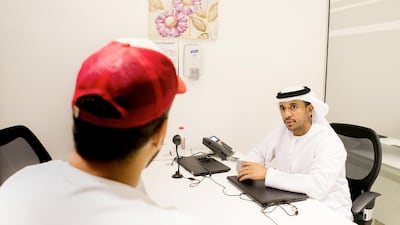Former drug addicts in the UAE have spoken of how young lives are being destroyed as Dubai Police launched a campaign to get parents to spot the signs of addiction and intervene.
Mohammed was just 16 when he started using hashish but that quickly led to harder drugs and it was more than 10 years before he finally beat the scourge of drug addiction.
Now clean for more than three years and a member of addiction support group Narcotics Anonymous (NA), he feels that addiction should be treated not punished, a view that is reflected in the updated drugs law issued last year.
“Drug addiction should be treated as a disease, not a crime,” he said. “When a person is found consuming opiates, he should not be punished but should be treated.
“Our group’s message is that any addict can stop using drugs and find a new way to live.”
The 32-year-old said trying to get clean was a “struggle” but now he hopes to help others in a similar situation.
“I started consuming drugs in 2001. I studied pharmacy and had access to different types of drugs. Then I started taking hard drugs and went through different stages in my life, including divorce,” Mohammed said.
“My family members were very supportive, even through my struggle with rehabilitation. They are not very strict and no one in the family had gone through a similar situation. I am the one who chose to take this ugly path.”
After reaching a crossroad in his life, Mohammed reached out to NA and is very thankful of their support. “I found people who accept me the way I am. We usually have meetings in different emirates to speak about any struggle we go through or about our major accomplishment, which is becoming clean and continuing our lives peacefully,” he said.
“There are no strings attached to NA. We are not interested in what you have done in the past but only in what you want to do about your problem and how we can help.”
There are currently 150 members of NA in Dubai, and the organisation has been running for 12 years.
Another former addict, also Mohammed, said he had been clean for seven years. “All members of NA have helped me a lot. They were always there when I needed them and were not expecting anything in return,” said the 31-year-old.
“I started when I was about 15. There is no specific reason that made me try a drug substance, I just felt different than others and I didn’t fit in with my peers.
“After I entered university, I consumed heavy drugs. I wanted to stop and thankfully I did by the age of 25.”
Sammar started on opiates after graduating from university. Now 30, she has recently got married and started a new life.
“I just wanted to try something new and it led me to addiction,” she said. “One of my friends said, ‘do you want to try?’ and I just tried it. When I first tried it, it made me happy and outspoken. Later on, I started consuming heavy drugs, such as heroin.
“Now, I am very happy that I am clean for almost two years.”
Dubai Police’s campaign Be with your children, they will be safe, was launched last week with the aim of alerting parents to the importance of being involved in their children’s lives.
Brig Eid Mohammed Thani Hareb, director of the anti-narcotics department at Dubai Police, said: “Parents should have tight control over their children, listen to their problems and keep communicating with them. This will help parents notice any abnormal behaviours and symptoms of addiction.”
Brig Hareb said the main reasons that youths fall into the trap of addiction are “peer pressure, bad friends and parent’s negligence”.
Sami Hassan, director of media relations at Erada Centre for Treatment and Rehab, said the centre was open to all comers and people as young as 16 had utilised their services.
“The centre has received drug users aged between 16 up to 38 years old,” Mr Hassan said.
“A 17-year-old boy injected himself with drugs along with his friends. The boy passed out and his friends put him in a taxi and asked the driver to take him to a hospital.
“If the boy was not taken to the hospital, he would have died.”
Mr Hassan said that in cases he has seen parental negligence was clear, with spoiling youths even being a factor in their drug use.
“For instance, I am dealing with a mother of a 24-year-old drug addict at the centre who used to give her son lots of money. When she found out he takes drugs, she tried not to give him money but the boy became violent and the mother has no other choice but to give him money to avoid domestic violence,” he said.
Anyone in need of help for drug issues can contact NA on 050 131 0055 or visit www.nauae.org.

